Huawei and SMIC blacklisted as Taiwan seeks to guard critical tech
Plus: Taiwan defense minister says 2 carriers in Pacific show China's expansionist agenda
Welcome to the latest edition of ASPI’s State of the Strait Weekly Digest. Read more about this new project here.
Each week ASPI's China team tracks Beijing’s pressure campaign against Taiwan, including military, economic, and diplomatic coercion, interference and espionage, information warfare, cyberwarfare, and lawfare.
Governments and organisations can contact ctspartnerships@aspi.org.au to discuss co-funding this project and gaining access to the entire State of the Strait database.
Analysis and commentary from the team is in ‘block quotes’ (the blue margins on the left). Please feel free to cite this newsletter as: State of the Strait #14, ASPI, 17 June 2025.
This edition covers the period: 10 June 2025 to 17 June 2025.
Follow the Australian Strategic Policy Institute on X, on LinkedIn, and on BlueSky.
This week's biggest news:
On 14 June, Taiwan added Chinese tech giants Huawei Technologies Co. and Semiconductor Manufacturing International Corporation (SMIC), along with several of their subsidiaries, to its Strategic High-Tech Commodities (SHTC) Entity List. Inclusion on Taiwan’s SHTC list designates a foreign company or organisation as a ‘sensitive or high-risk’ end user and triggers export controls that require Taiwanese firms to obtain government approval before supplying high-tech goods to the listed entities. The move significantly tightens restrictions on the flow of advanced technologies to China.
This action follows reports earlier this year that Huawei covertly obtained one million AI chips from TSMC—Taiwan’s semiconductor manufacturer—by routing orders through front companies, circumventing U.S. export controls. The scandal has put TSMC under scrutiny and exposed it to a potential USD 1 billion fine from U.S. authorities, underscoring the risks Taiwan faces at the nexus of global supply chains and great power competition. Taiwan’s blacklisting is more than a compliance measure—it’s also strategic.
By cutting off access to its semiconductor know-how, Taipei is targeting China’s military-civil fusion ambitions and blunting the tools of surveillance and economic coercion that threaten regional stability. Equally important is Taiwan’s domestic economic security. Taiwanese authorities have warned for years that Chinese firms like SMIC are engaging in industrial espionage, including poaching engineers and operating front companies to steal intellectual property. Blacklisting also empowers Taipei to restrict exports of even purely Taiwan-origin technologies, strengthens legal backing for firms to reject risky orders, and sends a clear strategic signal that these companies pose a national security threat. The move also helps prevent backdoor access through other Taiwanese suppliers.
Taiwan’s dominance in the global semiconductor supply chain makes it not just a player, but a chokepoint. Companies like TSMC manufacture the world’s most advanced chips, many of which are based on U.S. technology, fabricated in Taiwan, and protected by Taiwan-developed IP. In practice, U.S. export controls, Taiwan’s own outbound restrictions, and efforts to protect intellectual property are deeply interlinked. All aim to prevent Beijing from accessing cutting-edge technologies that could be repurposed for military or coercive ends. While the legal mechanisms may differ, the underlying objective is the same: to deny China strategic leverage through semiconductors.
On the horizon:
15-22 June: 17th Straits Forum, Xiamen, Fujian, China
9-18 July: Taiwan's ‘Han Kuang’ Military Exercises
By the numbers: This week’s incidents of coercion
Below are the incidents of coercion for the period: 10 June 2025 to 17 June 2025.
Military & paramilitary coercion
PLA reveals new weapons or military capabilities
China's two aircraft carriers operating simultaneously in the Pacific — Wellington Koo: This clearly reveals the nature of its expansionism [中國兩航艦太平洋同時活動 顧立雄:顯見擴張主義本質]
Central News Agency
According to Japan’s Ministry of Defence, China’s first domestically built aircraft carrier Shandong and the Liaoning carrier recently operated simultaneously in the Pacific for the first time. Defence Minister Wellington Koo stated on 11 June that Taiwan has a full grasp of the situation, emphasising that China is sending a political message—one that clearly reveals the nature of its expansionism.
Chinese aircarft carriers Shandong (top) and Liaoning. (Joint Staff of Japan's Ministry of Defense screenshot)
Mainland China scientists build electronic war game for Taiwan and nearby waters
South China Morning Post
The simulation was created by an electromagnetic battlespace emulator built by a team of researchers led by professor Shao Shihai from the University of Electronic Science and Technology in Chengdu, the capital of the southwestern province of Sichuan. “This method significantly improves computational speed while maintaining precision and high time-delay resolution,” they wrote in a peer-reviewed paper published by the Chinese-language Journal of Electronics & Information Technology in March. “[It] fulfils the computational requirements for channel modelling in large-scale battlefield environments,” they added.
Weekly Charts: PLA activities in the waters and airspace around Taiwan
Source for charts: Taiwan’s ministry of national defense monitors PLA-AF aircraft, PLA-N naval vessels and PRC official ships (e.g. coast guard) and high-altitude balloons operating in the waters and airspace around Taiwan. Numbers are recorded daily for the 24-hour period 0600 to 0600 Taiwan Standard Time (UTC+8).
Economic coercion
Corporate espionage or undermining business practices
Taiwan adds China's Huawei and SMIC to export control list
Reuters
Taiwan has added China's Huawei Technologies and Semiconductor Manufacturing International Corp (SMIC), opens new tab to its export control list, which includes other proscribed organisations like the Taliban and al Qaeda. Inclusion on the economy ministry's trade administration's strategic high-tech commodities entity list means Taiwanese companies will need government approval before exporting any products to the companies … Taiwan's government has also repeatedly vowed to crack down on what it says are efforts by Chinese companies, including SMIC, to steal technology and entice chip talent away from the island.
Interference & espionage
United front work targeting Taiwan
ASPI Comment: United front work targeting Taiwan is orchestrated by a network of party-state organisations that aim to influence, cultivate, and co-opt key figures within Taiwanese civil society. The Taiwan Affairs Office in China has described united front work as “an important magic weapon for the Communist Party of China to unite people and gather strength”. The CCP claims the right to speak on Taiwan’s behalf and uses united front work to claim legitimacy for annexation of Taiwan into the People’s Republic of China.
ASPI's State of the Strait tracks events that are facilitated by an agency within the united front and are intended to co-opt, exert malign influence, or redefine Taiwan, its people, and its history solely on CCP's terms.
Straits Forum kicks off with over 7,000 Taiwan participants
Global Times
The 17th Straits Forum kicked off on 15 June in Xiamen, East China's Fujian Province, with over 7,000 participants from various sectors on the island of Taiwan, including former chairman of the Chinese Kuomintang party Ma Ying-jeou, who led a delegation of Taiwan youth to attend … Continuing the theme of expanding people-to-people exchanges and deepening integrated development across the Taiwan Straits, this year's Straits Forum features a main forum event along with four major sections - grassroots exchanges, youth exchanges, cultural exchanges and economic exchanges, comprising a total of 56 activities, CCTV reported Sunday. The main venue for the forum is located in Xiamen, with concentrated activities taking place over the course of a week, according to the report.
Former Taiwan leader Ma Ying-jeou to return to mainland China despite warnings
South China Morning Post
Former Taiwanese leader Ma Ying-jeou is set to lead a delegation to mainland China, despite repeated warnings from Taiwanese authorities. On 11 June, the Ma Ying-jeou Foundation announced that Ma, who is a former chairman of Taiwan’s main opposition Kuomintang (KMT), would lead a student visit to mainland China from Saturday. He would conclude his trip on 27 June after attending the Straits Forum in Xiamen, a city that faces Taiwan across the Taiwan Strait, and travelling to the northwestern province of Gansu to attend a ceremony honouring Fuxi, one of the legendary ancestors of the Han Chinese, according to a statement.
Taiwan sets strict guidelines for cross-strait exchanges. TVBS
Taiwan ex-president criticized for attending China forum. Taiwan News
Espionage
Four former staff of Taiwan’s ruling party charged with spying for China
The Guardian
Taiwan prosecutors have charged four former staffers in the ruling Democratic Progressive party with spying for China while they worked in senior positions. The four include a former aide to Lai Ching-te when he was vice-president and for a time during his current presidency, and a senior staffer to Joseph Wu, then foreign minister and now the national security chief. They had been accused of sharing state secrets with China over a prolonged period of time, including “important and sensitive diplomatic information” that significantly harmed national security, prosecutors alleged in a statement. One of the accused, who worked for a Taipei city councillor, is accused of transmitting information to China “via a specific messaging app.”
Narrative & information warfare
Bellicose language about Taiwan
Beijing’s top Taiwan official warns independence forces will bring ‘disaster’ to island
South China Morning Post
Mainland China’s top official on Taiwan affairs has called on both sides of the Taiwan Strait to oppose “Taiwan independence and external interference” and promote closer integration. “Taiwan independence forces and their activities undermine national sovereignty and territorial integrity, disrupt peace and stability in our homeland, and incite confrontation and division among compatriots,” said Wang Huning, the fourth-ranking official of China’s ruling Communist Party. He made the comments at the opening ceremony of the annual Straits Forum in Xiamen, Fujian province on 15 June.
Top political advisor stresses jointly guarding Taiwan Strait peace, advancing reunification. China Daily
Disinformation campaigns designed to undermine Taiwan
Taiwan entrepreneur debunks myths about mainland
CGTN
Chiang Kuo-ming, a Taiwan entrepreneur who came to the Chinese mainland to start a business a year ago, has achieved a major milestone. He recently became the first Taiwan resident to receive a “Radio and Television Program Production and Operation License” from the mainland authorities. In an interview with CGTN, Chiang expressed confidence in the future of his venture. He also noted that many Taiwan visitors to the mainland have been surprised by what they see firsthand, often remarking, “Wait, this is nothing like what the media portrays”.
Hong Kong police tell people not to download ‘secessionist’ mobile game
The Guardian
Hong Kong police have warned people against downloading a Taiwan-developed mobile game which they say is “secessionist” and could lead to arrest. The game, Reversed Front: Bonfire, allows users to “pledge allegiance” to various groups linked to locations that have been major flashpoints or targets for China including Taiwan, Hong Kong, Tibet, Uyghurs, Kazakhs and Manchuria, in order to “overthrow the communist regime” known as the “People’s Republic”. While some aspects and place names of the game’s worldview are imagined, the website says the game is “a work of NON-FICTION” and “any similarity to actual agencies, policies, or ethnic groups of the PRC [China] in this game is INTENTIONAL”.
Hong Kong outlaws a video game, saying it promotes ‘armed revolution’. The New York Times
Amplifying criticism of Taiwan or the Lai administration
Taiwan influencer's livestreaming trip to mainland sparks buzz online, exposes DPP misinformation
China Daily
Taiwan internet influencer Chen Chih-han is livestreaming his personal six-day visit to the mainland to challenge the misleading and often negative image painted by some forces on the island, revealing a reality far different from the rhetoric many in Taiwan have been fed … Surveys showed that more than half of Taiwan people have never been to the mainland, the Taipei-based China Times reported in one article. The DPP, along with its affiliates and media pundits who control a large share of media resources, has long belittled and demonized the mainland.
Lai throttling democracy, freedom in Taiwan
China Daily
Taiwan leader Lai Ching-te has adopted a hostile attitude toward the Chinese mainland in a bid to advance the “Taiwan independence” agenda, and has been taking various measures that have undermined the stability across the Taiwan Strait, going further down the path of separatism. One of his main tactics has been to magnify the political differences between the two sides of the Strait. By hyping up the “democracy vs authoritarianism” narrative, Lai has been trying to deceive Taiwan residents and mislead international public opinion, and by raising cross-Strait tensions, Lai is trying to promote his “Taiwan independence” agenda.
Cyber warfare
Cyber attacks on Taiwan’s critical infrastructure
Taiwan jails Chinese ship captain for severing subsea cable
CNA
A Chinese ship captain was sentenced to three years in a Taiwanese prison on 12 June for deliberately severing an undersea telecoms cable off the self-ruled island. The captain, surnamed Wang, and his Togolese-registered cargo ship Hongtai were detained in February after a cable linking the Penghu archipelago and Taiwan was reported cut. A district court in southern Taiwan found Wang guilty of violating the Telecommunications Management Act for destroying a submarine cable and jailed him for three years.
Doxxing alleged Taiwanese cyber criminals
Taiwan cyber unit says it will not be intimidated by China bounty offer
Reuters
Taiwan's cyber forces will not be intimidated by China's threats of a bounty for the arrest of 20 people Beijing says are Taiwanese military hackers, and China's legal system has no jurisdiction on the island, its defence ministry said. Last week, the public security bureau in the Chinese city of Guangzhou said the hackers were part of the Taiwan military's Information, Communications and Electronic Force Command, and published their pictures, names and Taiwan identity card numbers, offering rewards of more than $1,000 for their arrest. On 11 June, China's Taiwan Affairs Office said the government will “pursue the matter to the end, and will not be lenient”, using legal channels to “crack down” on their activities.
Diplomatic coercion
Outreach to Taiwan’s last 12 diplomatic allies
Taiwan offers Guatemala aid as it guards its diplomatic flanks from China
News in America
Taiwan is offering aid to its lone Central American diplomatic ally, Guatemala, as it attempts to stave off efforts by China to win away its last remaining partners. During a meeting 12 June with his visiting Guatemalan counterpart Bernardo Arevalo, President Lai Ching-te said the two countries would “strengthen exchanges and cooperation as well as scholarship programs for young people, provide training for high-tech and information and communication talents.so as to push forward prosperity and development.”
For more on Beijing’s relentless campaign to isolate Taiwan diplomatically by getting its allies to switch recognision, see ‘Taiwan has 12 diplomatic partners left. Who’ll drop it next?’ in The Strategist here.
Challenging other countries’ One-China policies
Mainland urges U.S. to handle Taiwan question with utmost prudence
Xinhua
A Chinese mainland spokesperson on 11 June urged the United States to handle the Taiwan question with the utmost prudence. At a regular press conference, Zhu Fenglian, spokesperson for the Taiwan Affairs Office of the State Council, reiterated that the Taiwan question remains at the very core of China's core interests and is the foremost red line that must not be crossed in China-U.S. relations. She urged the U.S. side to strictly abide by the one-China principle and the provisions of the three China-U.S. joint communiques, to stop sending the wrong signals to separatist forces, and to prevent a small handful of separatists from undermining the broader China-U.S. relationship.
Lawfare
No incidents to report this week.
For more on how tech, cyber and policy intersect across the region, check out ASPI’s Daily Cyber & Tech Digest.


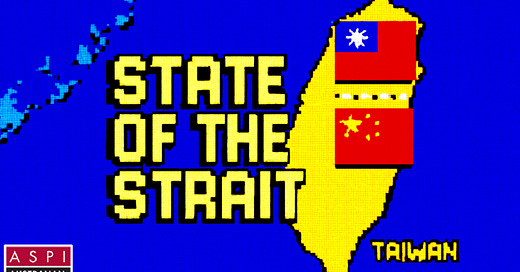




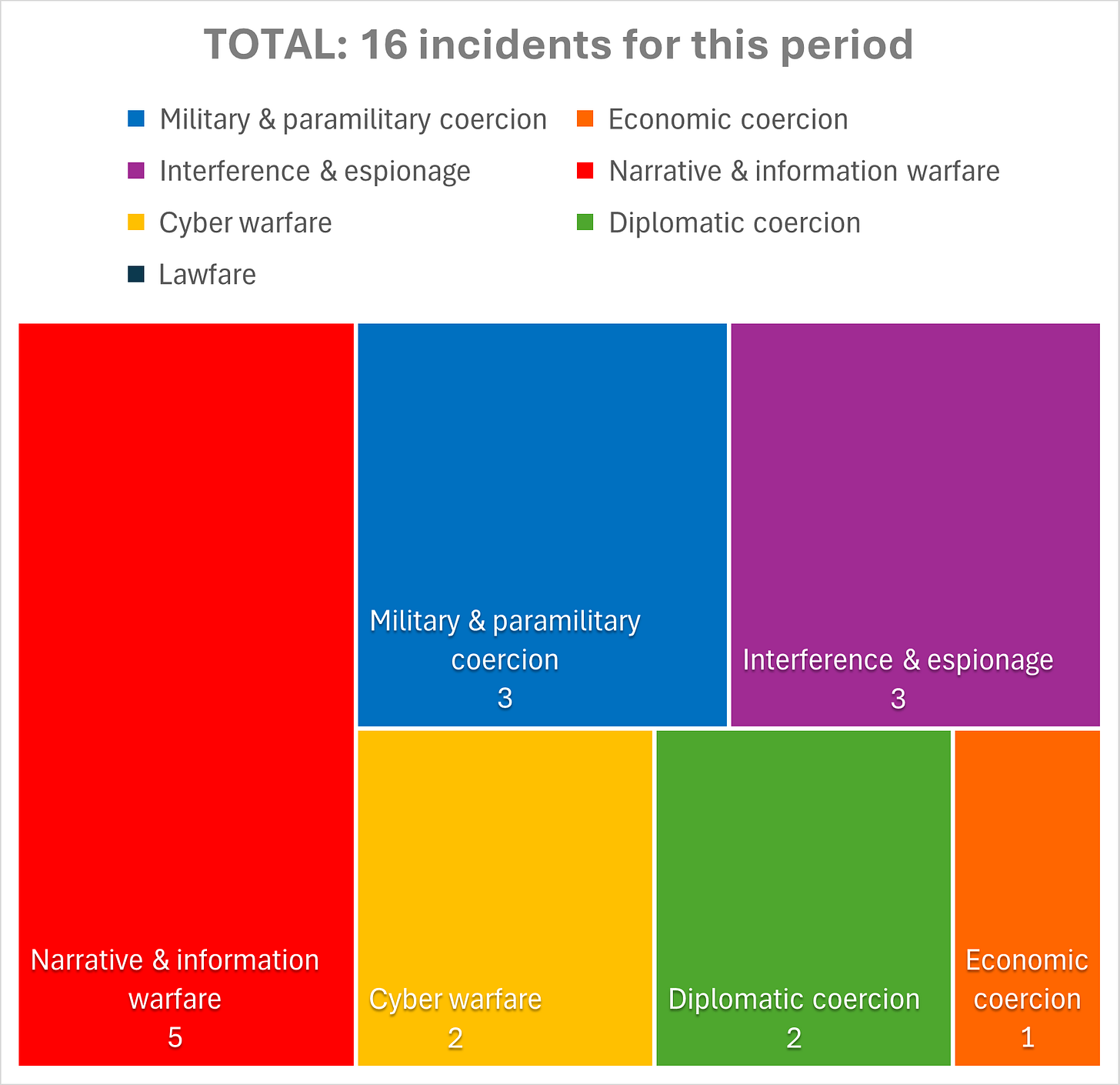
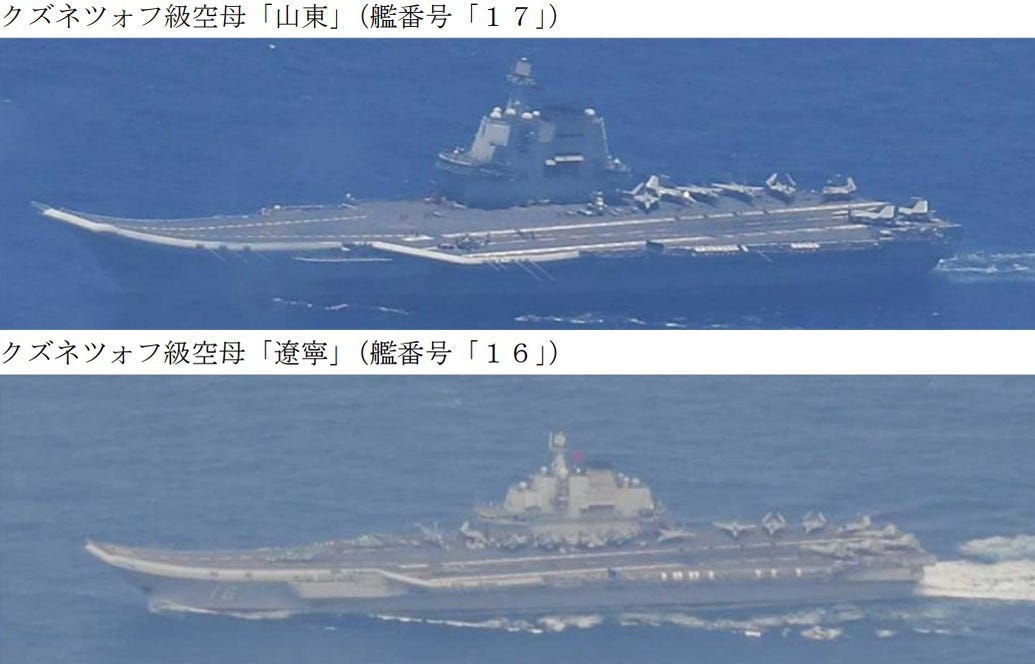
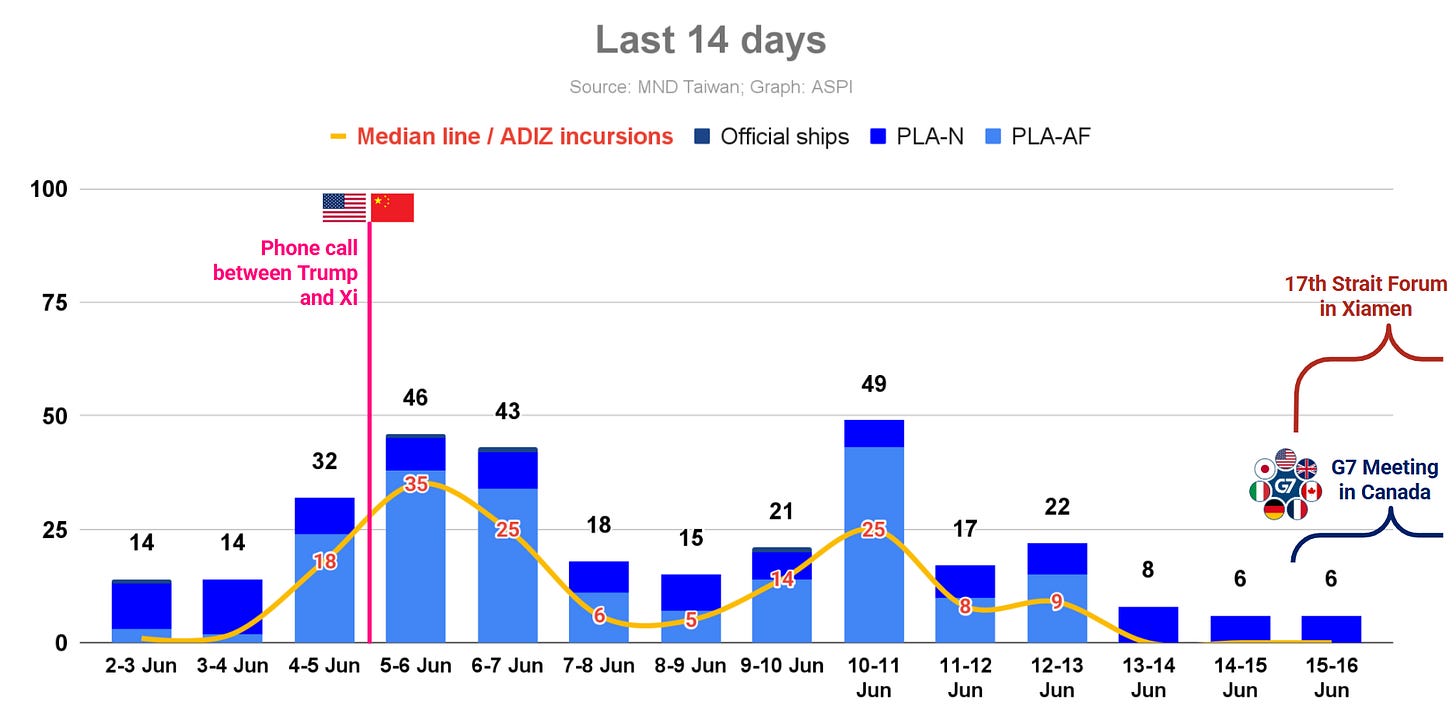



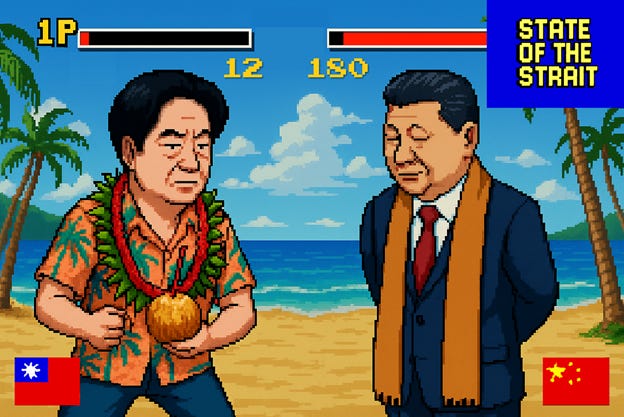

The KMT legislator’s proposal to amend Article 29 of the Act Governing Relations Between the People of the Taiwan Area and the Mainland Area raises serious concerns about weakening Taipei's authority in favour of localised engagement with the PRC.